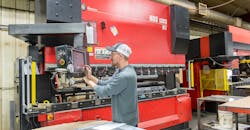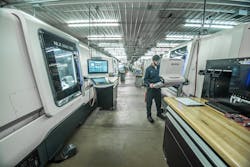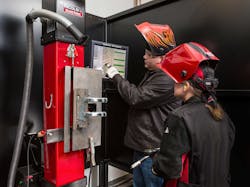When high school teacher Jacob Krautkremer signed up for a four-day summer internship at Wyoming Machine Inc. in 2017, he was hopeful.
An industrial technology teacher at Roseville Area High School in Minnesota, Krautkremer said he wanted to learn more about the manufacturing process and possibly create connections between his students and businesses.
Krautkremer wasn’t alone in his desire for the internship to bridge the gap between his students and the manufacturing industry.
Traci Tapani, co-president of Wyoming Machine, a metal fabrication company in Minnesota, said the company hosted a three-week, hands-on internship program for high school teachers in hopes they will return to their students in the fall and share their positive manufacturing experience.
“Often times, teachers are teaching some of those things and they don’t have hands on experience in manufacturing, so we’re helping to do that,” Tapani says.Programs like the internship Krautkremer was involved in at Wyoming Machine are mainly inspired by the industry’s widening body gap.
“The baby boomer exodus—which is real, we’re feeling this now with some intensity—is causing us to dig a little deeper for replacements,” said John Hazen White Jr., owner and chief executive officer of Taco Inc., a heating, cooling and plumbing manufacturer in Rhode Island, at a recent Brookings Institution forum on manufacturing. “At a company like Taco, we’ve had a half a percent turnover for the last 30 years, so finding new people is not something we’ve been doing regularly. It’s a challenge.”
The pace at which these manufacturing workers are retiring is much faster than the rate at which millennials and young people are entering the manufacturing workforce. There is also a large difference between what older generations and younger generations think of manufacturing.
So how can the industry better attract younger people to fill the gaps left behind by baby boomers? Manufacturers and industry leaders say technology, employee engagement and industry exposure will help revamp manufacturing into an attractive career path for millennials.
What’s Your Bigger Mission?
After polling over 2,000 national internet users in 2019, Brookings found that while 71% of people over the age of 55 think manufacturing is very important, only 45% of people ages 18 to 34 feel that way.
At the root of the industry’s body gap is the misconception that manufacturing is still assembly lines and repetitive work, says Eric Burkland, president of the Ohio Manufacturers’ Association, an advocacy group.
To repair the industry’s dark reputation and attract millennials, Buckley Brinkman, executive director and chief executive officer of the Wisconsin Center for Manufacturing and Productivity, says the industry needs to focus on creating a more stable job environment instead of pulling in prospective employees with fun onsite perks.
“The first thing they (manufacturing companies) need to understand is employee engagement,” he said. “If you think a ping-pong table is going to cut it, it’s not. At the end of the day, your environment has to be open and it has to be a place where people can feel comfortable and be heard.”
He added that if companies don’t already have a large technology presence and “elements and toys” millennials can play with, it won’t work.
“If they’re just making hoozists and whatsis, that’s not very attractive to anyone,” Brinkman says. “There must be a bigger mission. It’s not just making things, its robots and automation.”
While some manufacturers have yet to adjust to attracting younger employees, Brinkman says there are companies that are doing it right.
For example, not only did Tim Tumanic, chief executive officer of J&R Machine—a contract manufacturer in Shawano, Wisconsin—make an effort to hire younger employees, he also allowed them to apply their familiarity with technology on the job, Brinkman says.
“Tim turned around his company by aggressively recruiting millennials and engaging them in his business,” he says. “Tim and his son Parker actively targeted some of Parker’s friends to join his machine shop. He then invested in hardware and software that he allowed the kids to use to improve the operation,” including auto-feed CNC sawing machines and other multitasking equipment.
The 34 employees get treated to a bus trip to Innovation Days in Hoffman Estates, Illinois, to view the latest machine-tool technology and enjoy a steak dinner. Every other year, they close the shop and travel as a group to the International Manufacturing Technology Show in Chicago.
J&R Machine, which in 2019 was named Wisconsin Manufacturer of the Year, donated $200,000 in CNC machining equipment, tooling and materials to local schools’ undernourished industrial arts programs.
The manufacturer's efforts have paid off: In four years, from 2014 to 2018, J&R Machine grew 55%, to almost $12 million in sales, and completed a $1.7 million expansion of its facilities.
No Room to Say No
With 10,000 baby boomers retiring each day, Wyoming Machine isn’t the only company that’s feeling the pain of the increasingly massive baby boomer departures.
To engage with young prospective employees, Geoff Lipnevicius, operations manager for the automation division at Lincoln Electric in Cleveland, now says yes to every request for a factory tour.
“We had previously turned them away if they had said, ‘We have a math class and we’d like to bring our students in for a tour,’” he says. “Now, we say yes to everybody. Boy Scout troops, bring them in. Girl Scout troops, bring them in. You never know who you will influence.”Lipnevicius even offers tours after-hours.
“I say, ‘Here’s my card, if you want to bring your parents or grandparents in here, I will stay late, and I’ll give you a tour,” he says.
Lincoln Electric uses the factory tours to expose young people to modern manufacturing and quash the misconceptions that have plagued the industry since it was actually dark and dangerous (like 60 years ago).
“Our research shows that 84% of students who attend a manufacturing tour, who actually see manufacturing in action, are more likely to think positively about manufacturing,” he says.
The tours also shine a spotlight on Lincoln’s training and higher education opportunities. At its Cleveland headquarters, the manufacturing company offers seminars and workshops, as well its own welding school for employees who want to pursue a career in the industry while also earning a higher education certificate.
Lipnevicius adds that Lincoln Electric’s plant tours “yield over 50 high school graduates each year into entry-level assembler or machine operator positions.”
A Direct Approach
In addition to manufacturing companies engaging millennials and Generation Z through educating their teachers and giving tours, local manufacturing coalitions have started working with their communities to bring industry experience directly to local high schools.
The Manufacturers' Coalition, located in Torrington, Connecticut, and facilitated by the Northwest Connecticut Chamber of Commerce, has created multiple opportunities for high school students to be exposed not only to the reality of modern manufacturing, but to get ahead in the industry, too.
Robin Ledversis, principal of Torrington High School and volunteer at the Manufacturers’ Coalition, used her connections within the local manufacturing industry and her high school to help develop a solder training program with Altek Electronics, a contract electronics manufacturer.
The program, which started almost four years ago, helps connect non-technical high school students to the industry by teaching them how to solder computer circuit boards. The program works as direct exposure to the industry for students, while also filling Altek’s body gap with young prospective workers.
“They (Altek) couldn't find workers, so we developed an after-school program that the kids went through,” Ledversis says. “They ended up with a certification and then they got interviewed for a possible job. It led to jobs for some of the students.”
Working alongside leaders from Torrington High School, Northwestern Connecticut Community College (NCCC) and the coalition, Altek employees were instrumental in the course’s creation.
“Altek’s electrical engineer and production manager developed the syllabus and curriculum, advised NCCC what material and equipment to purchase and taught the class,” says Sabrina Beck, vice president of business development at Altek.
While the training program was initially held at NCCC, Ledversis, Altek and the Manufacturers’ Coalition have recently made the program more accessible to students by moving it directly to Torrington High School for their convenience.
“The one barrier that we had was that it (the program) was located about 20 minutes from our high school,” Ledversis says. “We decided to write a grant and get the equipment and then go to class at the high school, and we're just having our first class this year.”
Ledversis said the program, started in 2016, has shown her how important partnerships with the manufacturing industry are to Torrington’s students and community.
“When they graduate and know they’re not going to college, hopefully we can give them experiences, connections and the skills to be successful,” she says.
Beck said that in addition to school partnerships, manufacturing companies can do better with outreach and messaging when it comes to targeting younger people by participating in school science fairs and STEM camps, and financially supporting—as well as mentoring—school robotics clubs and programs.
A New Light
But once young people have been exposed to manufacturing, what’s in the industry for them to be excited about?
When asked at the Brookings forum if he thought there was a future for young people in manufacturing, John Hazen White, Jr. responded with a quick, “I think a very exciting one. The industry is transforming.”
With Taco University, Hazen White and his company are at the forefront of the industry’s transformation. The school, which is located at Taco’s development center in Cranston, Rhode Island, offers online classes and degree programs for young employees who want to get started in the industry but also want to obtain a higher education.
“(Taco University) was set up originally to teach work-related skills, like English as a second language, basic math, quality programs, all of the things people needed to grow in their jobs,” he said. “What we learned was that the more people learn, the more they want to learn. So they began to request more (classes) and this program became much more than workplace, job development. It became education to the point where we ultimately had a GED program, we had a citizenship program, a bachelor's program and now we have all the way up to a master’s degree in-house.”
At the same Brookings forum, David Brousell, vice president and executive director of the Manufacturing Leadership Council at the National Association of Manufacturers, said emerging technology is going to help the industry out of their body gap issue.
“Things have changed. The man on the white horse that we’ve been looking for has arrived and it’s called digitization," Brousell says. "This is the thing that’s going to change people’s minds and perceptions about manufacturing.
"Once they get a look at it and understand it, the type of jobs you’re going to be able to have in manufacturing are going to turn on a whole new light on what manufacturing is.”
He went on to add, “I think we’re at an inflection point. It's a huge opportunity, and if we can make the most of it, we can completely turn around that perception.” IW
About the Author
Abigail Miller
Reporter
Abigail Miller is a senior journalism major at Kent State University, reporting and editing at IndustryWeek as part of its 2019 summer editorial internship program.




